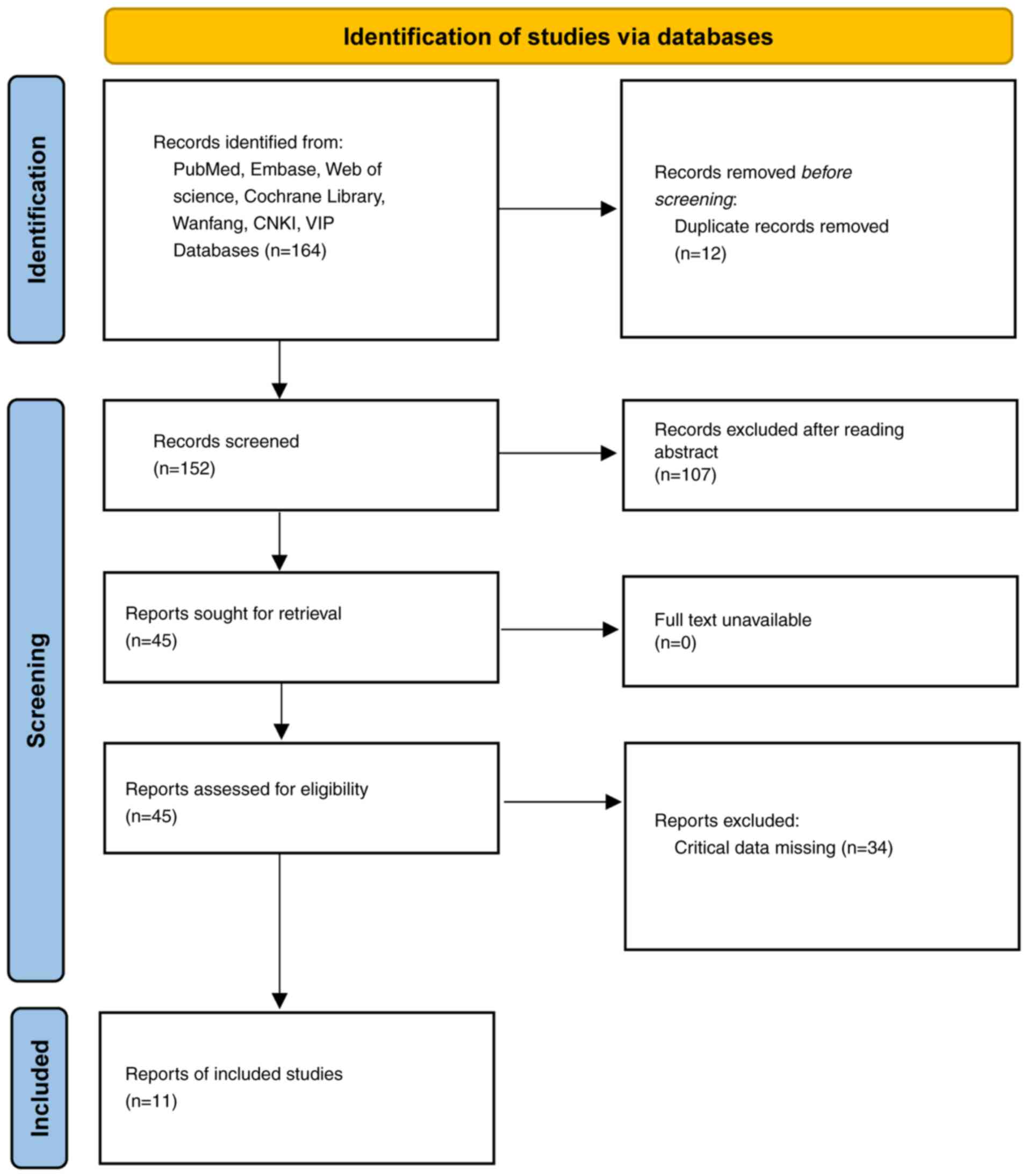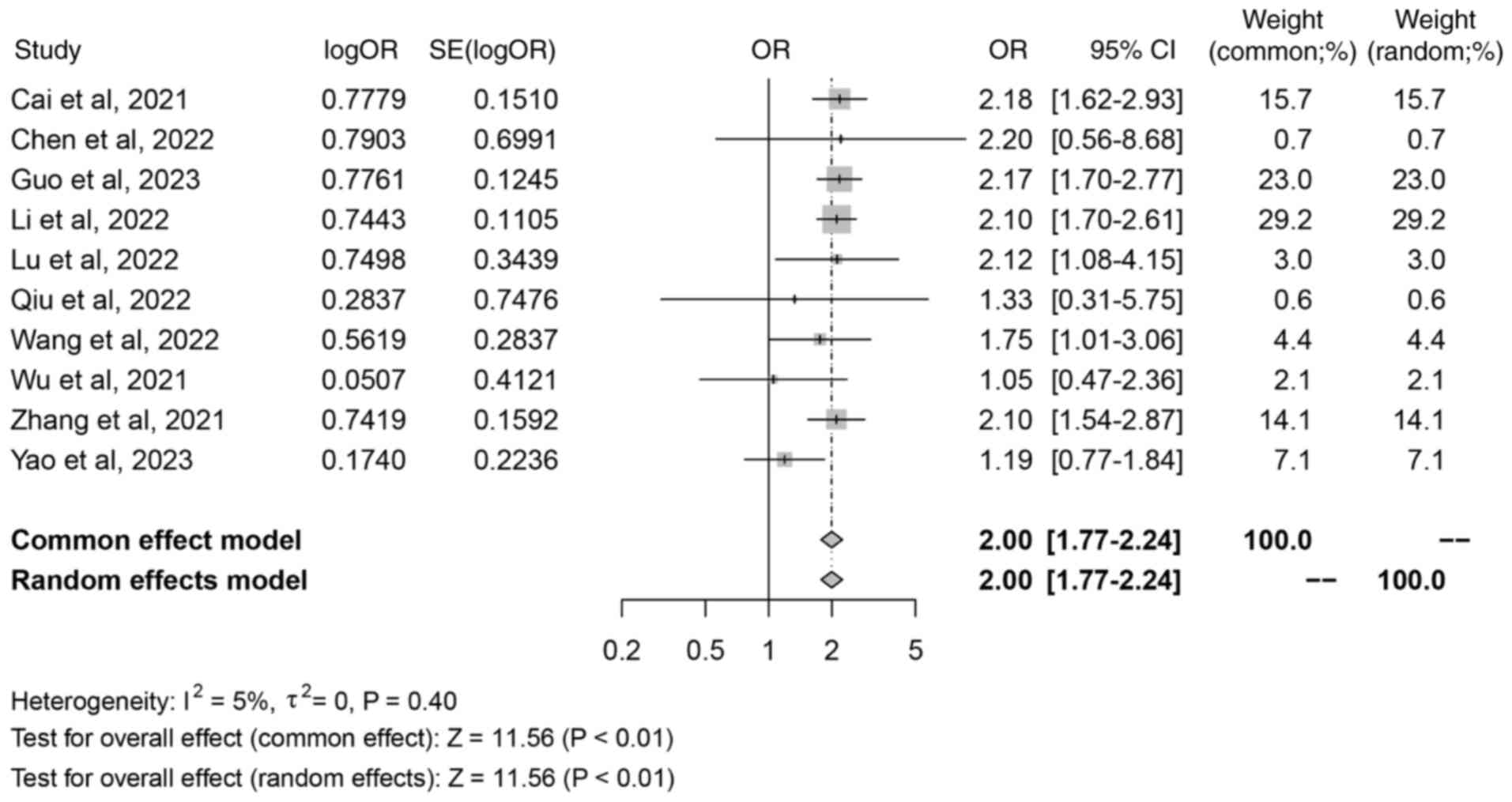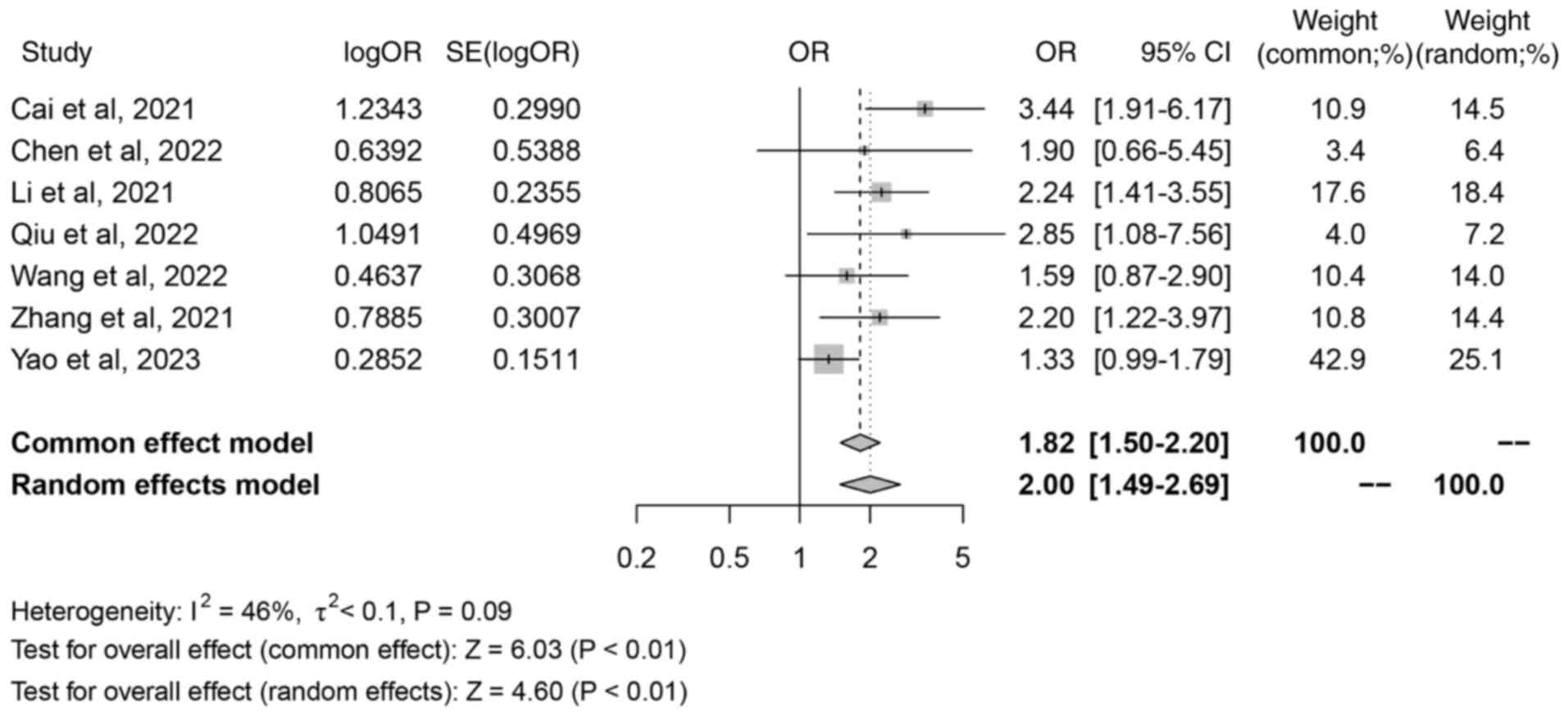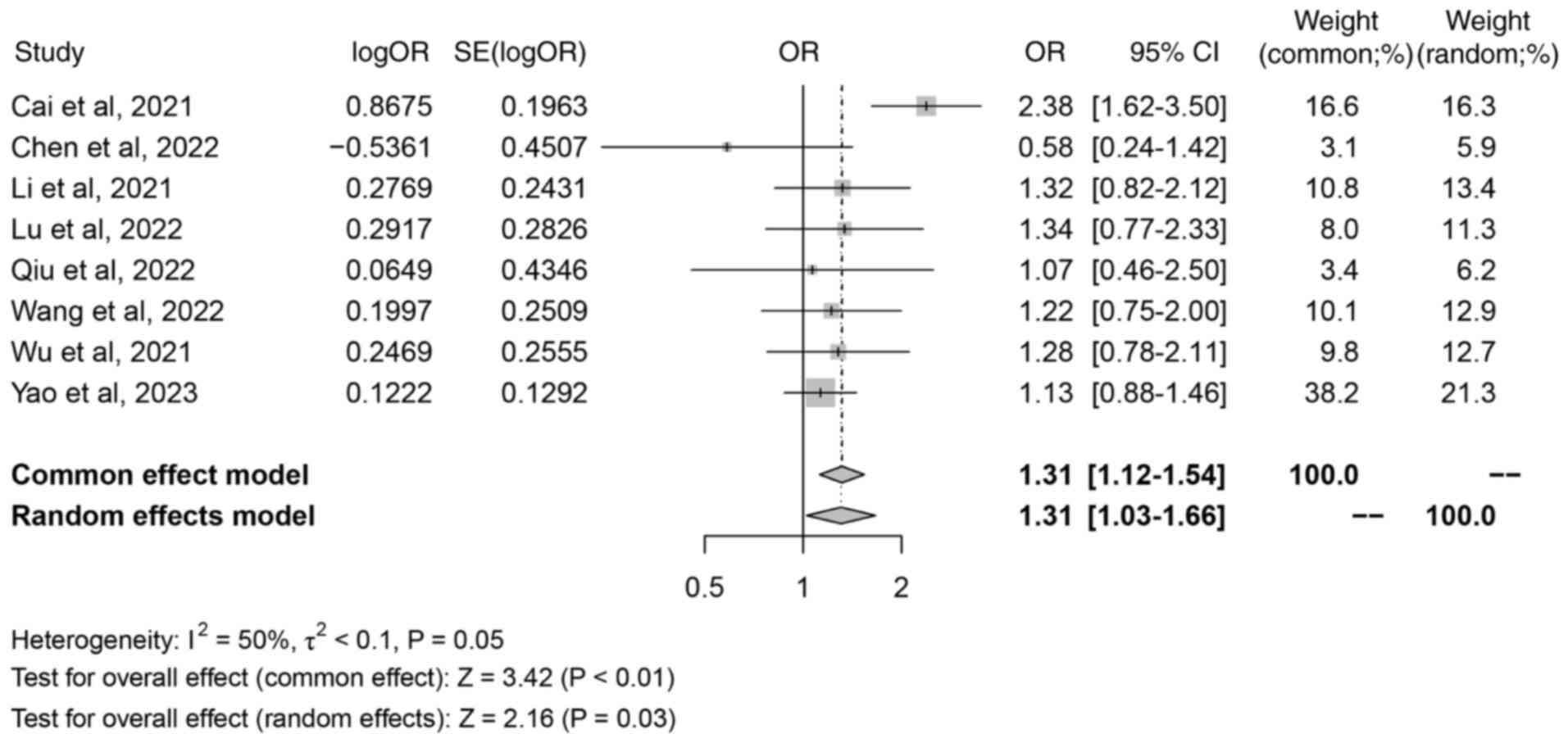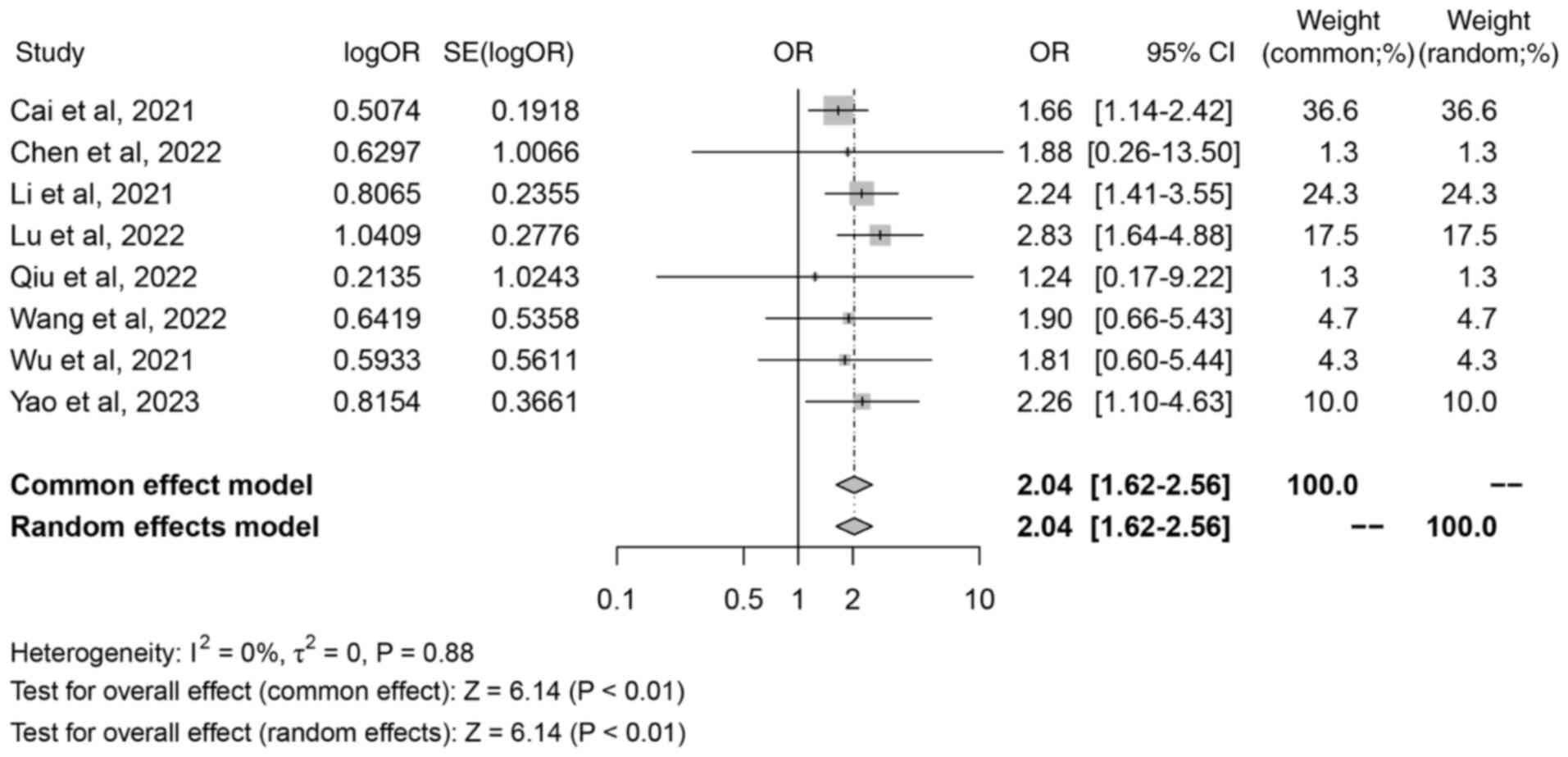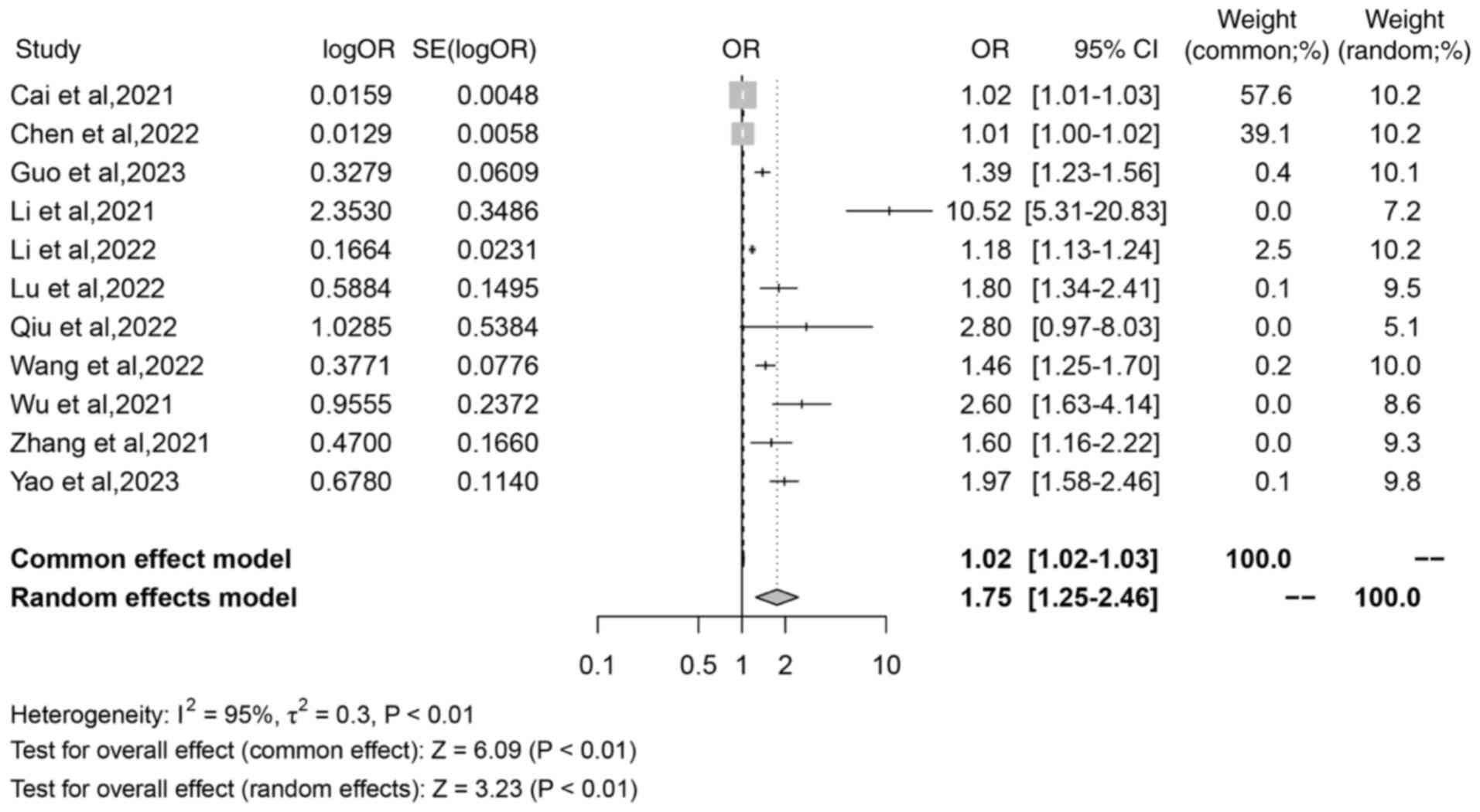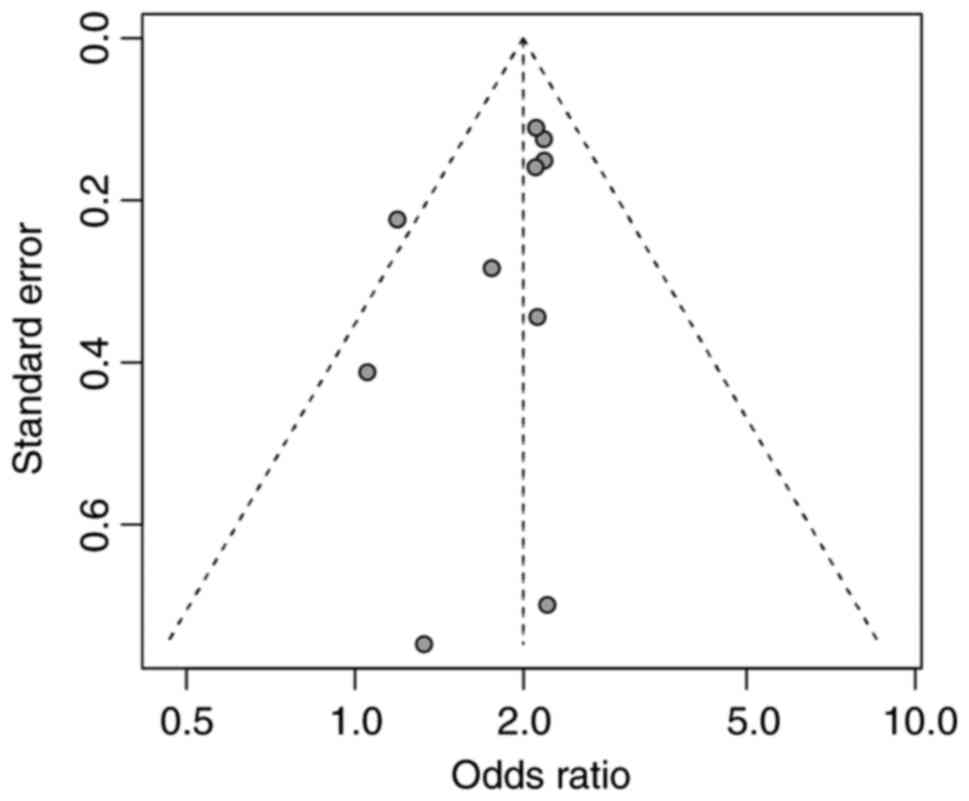|
1
|
Xu J, Zeng W, Liu T, Wan Z, Yang X, Chen J
and Liu F: lncRNA TINCR knockdown inhibits colon cancer cells via
regulation of autophagy. Food Sci Nutr. 11:1965–1981. 2023.
View Article : Google Scholar : PubMed/NCBI
|
|
2
|
Yu Y, Xu Z, Ni H, Jin M and Dai C:
Clinicopathological and prognostic value of long non-coding RNA
CCAT1 expression in patients with digestive system cancer. Oncol
Lett. 25:732023. View Article : Google Scholar : PubMed/NCBI
|
|
3
|
Qu A, Wang Q, Chang Q, Liu J, Yang Y,
Zhang X and Zhang Y, Zhang X, Wang H and Zhang Y: Prognostic and
predictive value of a lncRNA signature in patients with stage II
colon cancer. Sci Rep. 13:13502023. View Article : Google Scholar : PubMed/NCBI
|
|
4
|
Liang GZ, Wen XF, Song YW, Zhang ZJ, Chen
J, Chen YL, Pan WD, He XW, Hu T and Xian ZY: Construction and
validation of a novel prognosis model in colon cancer based on
cuproptosis-related long non-coding RNAs. J Clin Med. 12:15282023.
View Article : Google Scholar : PubMed/NCBI
|
|
5
|
Liau XL, Salvamani S, Gunasekaran B,
Chellappan DK, Rhodes A, Ulaganathan V and Tiong YL: CCAT 1-a
pivotal oncogenic long non-coding RNA in colorectal cancer. Br J
Biomed Sci. 80:111032023. View Article : Google Scholar : PubMed/NCBI
|
|
6
|
Liu S, Zhang S, Liu Y, Yang X and Zheng G:
Comprehensive analysis of cuproptosis-related long noncoding RNA
for predicting prognostic and diagnostic value and immune landscape
in colorectal adenocarcinoma. Hum Genomics. 17:222023. View Article : Google Scholar : PubMed/NCBI
|
|
7
|
Sepehri Z, Banerjee A, Vizeacoumar FS,
Freywald A, Vizeacoumar FJ, Dolinsky VW and Davie JR: Differential
expression of HNF1A and HNF1A-AS1 in colon cancer cells. IUBMB
Life. 74:496–507. 2022. View
Article : Google Scholar : PubMed/NCBI
|
|
8
|
Luo J, Peng J, Xiao W, Huang S, Cao Y,
Wang T and Wang X: A novel necroptosis-related lncRNA signature for
predicting prognosis and immune response of colon cancer. Front
Genet. 13:9846962022. View Article : Google Scholar : PubMed/NCBI
|
|
9
|
Luo Y, Huang S, Wei J, Zhou H, Wang W,
Yang J, Deng Q, Wang H and Fu Z: Long noncoding RNA LINC01606
protects colon cancer cells from ferroptotic cell death and
promotes stemness by SCD1-Wnt/β-catenin-TFE3 feedback loop
signalling. Clin Transl Med. 12:e7522022. View Article : Google Scholar : PubMed/NCBI
|
|
10
|
Li H, Liu L, Huang T, Jin M, Zheng Z,
Zhang H, Ye M and Liu K: Establishment of a novel
ferroptosis-related lncRNA pair prognostic model in colon
adenocarcinoma. Aging (Albany NY). 13:23072–23095. 2021. View Article : Google Scholar : PubMed/NCBI
|
|
11
|
Wu Z, Lu Z, Li L, Ma M, Long F, Wu R,
Huang L, Chou J, Yang K, Zhang Y, et al: Identification and
validation of ferroptosis-related LncRNA signatures as a novel
prognostic model for colon cancer. Front Immunol. 12:7833622021.
View Article : Google Scholar : PubMed/NCBI
|
|
12
|
Zhang W, Fang D, Li S, Bao X, Jiang L and
Sun X: Construction and validation of a novel ferroptosis-related
lncRNA signature to predict prognosis in colorectal cancer
patients. Front Genet. 12:7093292021. View Article : Google Scholar : PubMed/NCBI
|
|
13
|
Cai HJ, Zhuang ZC, Wu Y, Zhang YY, Liu X,
Zhuang JF, Yang YF, Gao Y, Chen B and Guan GX: Development and
validation of a ferroptosis-related lncRNAs prognosis signature in
colon cancer. Bosn J Basic Med Sci. 21:569–576. 2021.PubMed/NCBI
|
|
14
|
Li N, Shen J, Qiao X, Gao Y, Su HB and
Zhang S: Long non-coding RNA signatures associated with ferroptosis
predict prognosis in colorectal cancer. Int J Gen Med. 15:33–43.
2022. View Article : Google Scholar : PubMed/NCBI
|
|
15
|
Lu J, Tan J and Yu X: A prognostic
ferroptosis-related lncRNA model associated with immune
infiltration in colon cancer. Front Genet. 13:9341962022.
View Article : Google Scholar : PubMed/NCBI
|
|
16
|
Qiu Y, Li H, Zhang Q, Qiao X and Wu J:
Ferroptosis-related long noncoding RNAs as prognostic marker for
colon adenocarcinoma. Appl Bionics Biomech. 2022:52203682022.
View Article : Google Scholar : PubMed/NCBI
|
|
17
|
Chen W, Chen Y, Liu L, Wu Y, Fu P, Cao Y,
Xiong J, Tu Y, Li Z, Liu Y and Jie Z: Comprehensive analysis of
immune infiltrates of ferroptosis-related long noncoding RNA and
prediction of colon cancer patient prognoses. J Immunol Res.
2022:94806282022. View Article : Google Scholar : PubMed/NCBI
|
|
18
|
Wang Y, Zhang Y, Xu W and Cui X:
Construction and clinical application of colon cancer prognostic
risk model of ferroptosis-related lncRNA. Laboratory Med.
37:720–728. 2022.(In Chinese).
|
|
19
|
Li Y, Huan S and Xiang L: Construction and
validation of colorectal cancer prognosis risk model based on iron
death-related lncRNA. Zhejiang J Clin Med J. 25:167–171. 2023.(In
Chinese).
|
|
20
|
Guo S, Song B, Li L, Li H, Yang T, Cao L
and Wang J: lncRNA HCG11 promotes colorectal cancer cell malignant
behaviors via sponging mir-26b-5p. J Immunol Res. 2023:90112322023.
View Article : Google Scholar : PubMed/NCBI
|
|
21
|
Stang A: Critical evaluation of the
Newcastle-Ottawa scale for the assessment of the quality of
nonrandomized studies in meta-analyses. Eur J Epidemiol.
25:603–605. 2010. View Article : Google Scholar : PubMed/NCBI
|
|
22
|
Hosseini FA, Rejali L, Zabihi MR, Salehi
Z, Daskar-Abkenar E, Taraz T, Fatemi N, Hashemi M,
Asadzadeh-Aghdaei H and Nazemalhosseini-Mojarad E: Long non-coding
RNA LINC00460 contributes as a potential prognostic biomarker
through its oncogenic role with ANXA2 in colorectal polyps. Mol
Biol Rep. 50:4505–4515. 2023. View Article : Google Scholar : PubMed/NCBI
|
|
23
|
Zhao C, Gan C, Xiao Y, Liu R, Zhang L, Lan
T, Ye Y, Tong H, Huang Z, Tang C and Gao J: High expression of long
non-coding RNA Linc-A associates with poor survival in patients
with colorectal cancer. Mol Biol Rep. 47:7497–7504. 2020.
View Article : Google Scholar : PubMed/NCBI
|
|
24
|
Tsai KW, Lo YH, Liu H, Yeh CY, Chen YZ,
Hsu CW, Chen WS and Wang JH: Linc00659, a long noncoding RNA, acts
as novel oncogene in regulating cancer cell growth in colorectal
cancer. Mol Cancer. 17:722018. View Article : Google Scholar : PubMed/NCBI
|
|
25
|
Gaballah HH, Gaber RA, Elrashidy MA,
Elshahat DA, Hablus MA and Ebeid AM: Expression of long non-coding
RNA CCHE1 in colorectal carcinoma: correlations with
clinicopathological features and ERK/COX-2 pathway. Mol Biol Rep.
46:657–667. 2019. View Article : Google Scholar : PubMed/NCBI
|
|
26
|
Xiong Z, Li W, Luo X, Lin Y, Huang W and
Zhang S: Seven bacterial response-related genes are biomarkers for
colon cancer. BMC Bioinformatics. 24:1032023. View Article : Google Scholar : PubMed/NCBI
|
|
27
|
Shaalan AAM, Mokhtar SH, Ahmedah HT,
Almars AI, Toraih EA, Ibrahiem AT, Fawzy MS and Salem MA:
Prognostic value of LINC-ROR (rs1942347) variant in patients with
colon cancer harboring BRAF mutation: A propensity score-matched
analysis. Biomolecules. 12:5692022. View Article : Google Scholar : PubMed/NCBI
|















